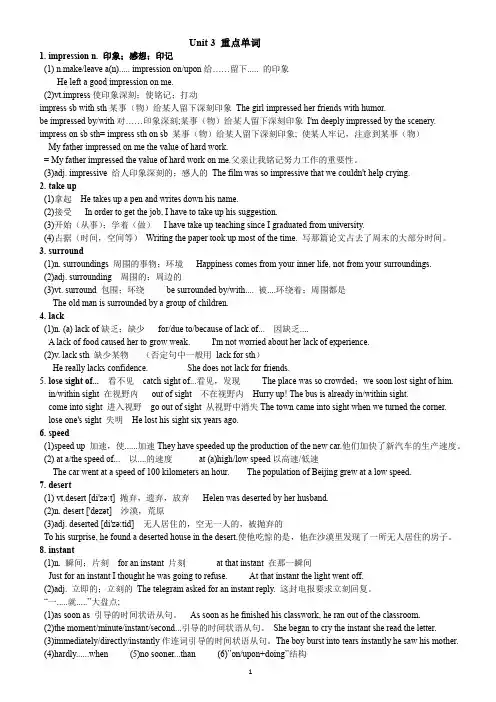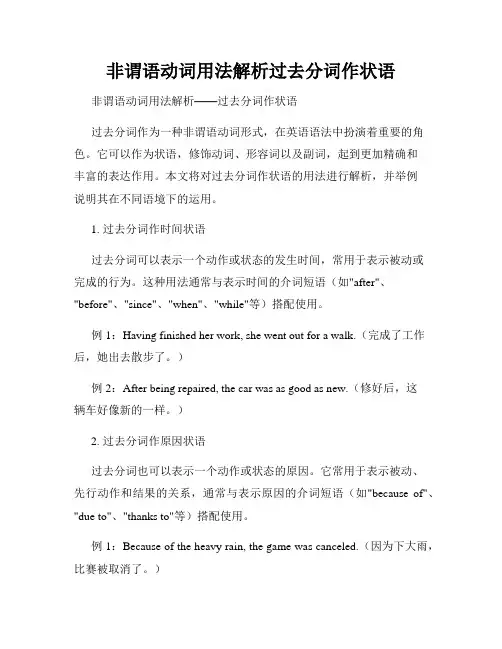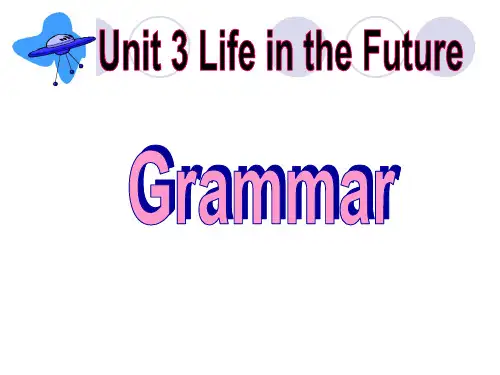高二英语必修五 语法过去分词作状语
必修5 Unit 3 过去分词作状语

Compare
1. Following the old man, we went
upstairs.—we followed
(跟着那个老人, 我们上去了)
2. Followed by the old man, we went upstairs. (we were) (被那个老人跟着, 我们上去了)
注意:选择现在分词还是过去分词, 关键看主句的主语。如分词的动作是 主句的主语发出,分词就选用现在分 词,反之就用过去分词。
3. I felt very tired after the long journey. I still enjoyed meeting the aliens on the space station. Tired after the long journey, I still enjoyed meeting the aliens on the space station.
1. _____for a long time, the book looks old. Used 由于用了很长时间,这本书看上去很旧. Using 2. ______ the book, I find it useful. 在使用的过程中,我发现这本书很有用.
主句主语是分词的发出者,就用现在分词; 主句主语是分词的受动着,就用过去分词。
Frightened by the loud noise, I went to see what was happening. 2. He was hit by the lack of fresh air. He got a bad headache. Hit by the lack of fresh air, he got a bad headache.
必修5 Unit 3 单词语法 过去分词做状语及练习题

Unit 3 重点单词1. impression n. 印象;感想;印记(1) n.make/leave a(n)..... impression on/upon给……留下..... 的印象He left a good impression on me.(2)vt.impress使印象深刻;使铭记;打动impress sb with sth某事(物)给某人留下深刻印象The girl impressed her friends with humor.be impressed by/with对……印象深刻;某事(物)给某人留下深刻印象I'm deeply impressed by the scenery. impress on sb sth= impress sth on sb 某事(物)给某人留下深刻印象; 使某人牢记,注意到某事(物)My father impressed on me the value of hard work.= My father impressed the value of hard work on me.父亲让我铭记努力工作的重要性。
(3)adj. impressive 给人印象深刻的;感人的The film was so impressive that we couldn't help crying.2.take up(1)拿起He takes up a pen and writes down his name.(2)接受In order to get the job, I have to take up his suggestion.(3)开始(从事);学着(做)I have take up teaching since I graduated from university.(4)占据(时间,空间等)Writing the paper took up most of the time. 写那篇论文占去了周末的大部分时间。
必修五第三单元过去分词作状语课件

伴随状语
表示动作的伴随情况
过去分词作伴随状语,通常放在句首或句末,表示某个动作伴随另一个动作发生。例如,“He sat in the armchair, reading a book.”(他坐在扶手椅上,读着一本书。)
目的在句首或句末,表示某个动作 是为了达到某种目的而发生的。例如,“To get a better score, he studied hard for the exam.”(为了获得更好的 成绩,他努力学习准备考试。)
特点
过去分词作状语通常出现在句子的开 头,表示一种独立的结构,不依赖于 其他从句或句子成分。
常见用法
时间状语
原因状语
过去分词作时间状语通常用于表示某 个动作发生在主句谓语动作之前,如 “Having finished his homework, he went to bed.”
过去分词作状语可以表示某个动作或 状态是导致主句谓语动作发生的原因 ,如“Having failed the exam, he felt very upset.”
详细描述
例如,“Having been given a chance, he didn't hesitate for a second.”这句话中 ,过去分词“given”表示“被给机会”的动作发生在“didn’t hesitate”之前,但
整个句子的时态是过去时,与“given”所表示的过去的过去时态不匹配。
THANKS
感谢观看
04
过去分词作状语的练习与 解析
单项选择题解析
总结词
单项选择题是考察学生对过去分词作状 语的理解和应用能力的题型。
VS
详细描述
单项选择题通常会给出一段含有过去分词 作状语的句子,要求学生判断其语法正确 性或选择最合适的选项。这类题目要求学 生掌握过去分词的用法,理解其在句子中 的作用,并能够根据语境进行正确的判断 。
必修五第三单元过去分词作状语

4. 让步
iphone
Although my mother was persuaded to buy an iphone 6, she still doesn’t know how to use it.
Persuaded to buy an iphone 6, my mother still doesn’t know how to use it.
4. 让步 相当于though, although引导的从句。
Laughed at by many people, he continued his study.
Though/Although he was laughed at by many people,…
5. 方式,伴随
Tom
Jerry
Jerry came into the room and he was followed by Tom.
(2) Asked why she was late, she went red in the face. 2)小偷如果W被he抓n s,he会wa受s a到ske警d w方hy 的she惩wa办s l。ate,…
(1) If caught, the police will punish the thief.
Brought up in the
countryside, he is
country
interested in biology.
2. 原因
相当于as, since, because引导的从句, 这 类状语多放在句子前半局部。
Because it is sung by many people, the song Little Apple is quite popular now.
非谓语动词用法解析过去分词作状语

非谓语动词用法解析过去分词作状语非谓语动词用法解析——过去分词作状语过去分词作为一种非谓语动词形式,在英语语法中扮演着重要的角色。
它可以作为状语,修饰动词、形容词以及副词,起到更加精确和丰富的表达作用。
本文将对过去分词作状语的用法进行解析,并举例说明其在不同语境下的运用。
1. 过去分词作时间状语过去分词可以表示一个动作或状态的发生时间,常用于表示被动或完成的行为。
这种用法通常与表示时间的介词短语(如"after"、"before"、"since"、"when"、"while"等)搭配使用。
例1:Having finished her work, she went out for a walk.(完成了工作后,她出去散步了。
)例2:After being repaired, the car was as good as new.(修好后,这辆车好像新的一样。
)2. 过去分词作原因状语过去分词也可以表示一个动作或状态的原因。
它常用于表示被动、先行动作和结果的关系,通常与表示原因的介词短语(如"because of"、"due to"、"thanks to"等)搭配使用。
例1:Because of the heavy rain, the game was canceled.(因为下大雨,比赛被取消了。
)例2:Due to his hard work, he achieved great success.(由于他的努力,他取得了巨大的成功。
)3. 过去分词作方式状语过去分词还可以表示一个动作的方式或方式。
它常与表示方式的介词短语(如"by")或连词(如"as")搭配使用。
例1:He won the race by running faster than others.(他通过比其他人跑得更快赢得了比赛。
必修5unit3语法过去分词作状语PPT课件

Combine the two sentences
our future school
1.When our future school is seen from the space, our future school looks like a plate. Seen from the space, our future school looks like a plate.
3. Past Participle can be used as object complement
She had her hair cut (cut) The old man saw his bike repaired
(repair) by a policeman. The thief came out with his hands tied
1. Past Participle can be used as attribute
The ground is covered by fallen (fall) leaves.
Who were the guests invited (invite) to Tom’s concert last month?
Deeply moved (move) by liyang’s speech, he shed (流下) tears.
Please find out the past participles.
1.The s_t_o__le__n_bike belongs to Jack.1.作定语
过 2.The glass is b_r_o__k_e_n_ .
4. Past Participle can be used as adverbial
【高二学习指导】高二英语必修五语法知识点:过去分词做状语
【高二学习指导】高二英语必修五语法知识点:过去分词做状语高二英语必修五语法知识点:第三讲过去分词作状语。
高二英语语法知识点比较容易混淆,所以同学们想要牢固掌握住知识点,就要在题海中去慢慢领悟。
在旅途中,我为这几天感到担忧。
confusedbythenewsurroundings,iwashitbythelackoffreshair.筋疲力尽,我躺在床上,睡着了。
过去分词作状语:过去分词作状语时,说明动作发生的背景或情况,其等同于一个状语从句。
vt过去分词作状语时与主句主语构成被动关系,表示被动和完成,vi过去分词表示状态或动作的完成。
加热后的水在奥斯塔姆更换。
theprofessorcamein,followedbyagroupofyoungpeople.作为一个原因状语,它等同于As/since/becausemovedbywhatshesaid,wecouldn’thelpcrying.=(aswearemovedbywhatshesaid…如果分词的动作和谓语的动作同时发生,你可以在分词前加上when/while/till,使时间的意义更清楚。
whenheated,watercanbechangedintosteam.从山上看,公园看起来非常美丽(当他们从山上看到他们时…3作条件状语等于if/whether引导从句如果给予再护理,则伤口会生长得更好(如果他们得到更多的关注…。
4作方式或伴随状语携带者来了,跟随着他们。
shesatbythewindow,lostinthought.5作为让步状语muchtired,hestillkeptonworking.=(althoughhewastired,)he….独立主格结构:当分词的逻辑主语不是句子的主语时,分词可以有自己独立的逻辑主语。
这种结构被称为独立主格结构。
它通常用来表示伴随的情况。
theboyrushedintotheclassroom,hisfacecoveredwithsweat.综上所述,你的文章比她的更有价值。
高二英语人教版必修五讲义Unit3SectionⅢGrammar过去分词作状语
[语法初识]原句感知自主探究1.①Worried about the journey, I wasunsettled for the first few days.②Given better attention, the trees could grow better.③Described as an enormous round plate, it spins slowly in space to imitate the pull of the earth’s gravity.2.①Hit by a lack of fresh air, my head ached. (1)作状语用的过去分词(短语)和句子的主语之间是逻辑上的动宾关系,或称为被动关系。
(2)第一组句子中的过去分词(短语)分别在句子中作:①原因状语;②条件状语;③伴随情况或方式状语。
=Because I was hit by a lack of fresh air,my head ached.②I stared at the moving model of the waste machine, absorbed by its efficiency.=I stared at the moving model of the waste machine, and was absorbed by its efficiency. 3.①When offered help, one often says“Thank you”or“It’s kind of you.”②The research is so designed that once begun nothing can be done to change it. (3)比较第二组句子可知,作状语用的过去分词(短语)可以转化成相应的状语从句或并列句。
(4)从第三组句子可知,表示时间、条件、方式、比较或让步的状语,可用“从属连词+过去分词”结构。
高中英语人教版必修五 Unit3 Grammar动词过去分词作状语
Past participle (3) used as Adverbial 过去分词作状语
过去分词
过去分词是非谓语动词的一种形 式,表示完成和被动的动作。它在句子 中可以充当状语、定语等成分。
过去分词表完成或被动, 作状语时, 其逻辑主语是主句的主语, 且与主语 之间存在着被动关系。过去分词作 状语可表时间, 原因, 让步, 方式, 伴 随,条件等。
=Even if / Though it is explained a hundred times, the problem still can't be understood.
过去分词作让步状语
归纳: 过去分词作让步状语,相当于一个 由though, although 或 even if / though等引导的让步状语从句。
= The teacher stood there and he was surrounded by the students.
过去分词作方式或伴随状语
归纳: 过去分词作方式或伴随状语,若有 连词 as if, 就转换为 as if 引导的方 式状语从句;若无连词,则转换为 并列结构。
随堂练习 1. 句型转换:
4. Given more time, we would be able to do the work much better. If we were given more time, we would be able to do the work much better.
5. Once translated into Chinese, the book became very popular among Chinese teenagers. Once it was translated into Chinese, the book became very popular among Chinese teenagers.
人教版高二英语语法必修五知识点:过去分词做状语
人教版高二英语语法必修五知识点:过去分词做状语Worriedaboutthejourney,Iwasunsettledforthefirstfewdays.Well-knownfortheirexpertise,hisparents’company…..Confusedbythenewsurroundings,Iwashitbythelackoffreshair.Exhausted,Islidintothebedandfellfastasleep.过去分词作状语:过去分词作状语时,说明动作发生的背景或情况,其等同于一个状语从句。
vt过去分词作状语时与主句主语构成被动关系,表示被动和完成,vi过去分词表示状态或动作的完成。
Heated,waterchangesintosteam.Theprofessorcamein,followedbyagroupofyoungpeople.1作原因状语,等于as/since/because引导从句Movedbywhatshesaid,wecouldn’thelpcrying.=(Aswea removedbywh atshesaid…2作时间状语,等于when引导时间从句,如果分词表示的动作与谓语的动作同时发生,可在分词前加when/while/until等使时间意义更明确。
Whenheated,watercanbechangedintosteam.Seenfromthehill,theparklooksverybeautiful.=(Whentheparkisse enfromthehill…3作条件状语等于if/whether引导从句Givenmoreattention,thecabbagescouldhavegrownbetter.=(Ifthey havebeengivenmoreattention….Comparedwithyou,westillhavealongwaytogo=(Ifwearecomparedwit hyou…4作方式或伴随状语Theactresscamein,followedbyherfans.Shesatbythewindow,lostinthought.5作让步状语Muchtired,hestillkep tonworking.=(Althoughhewastired,)he….6独立主格结构:当分词的逻辑主语不是主句主语时,分词可以有自己独立的逻辑主语,这种结构称为独立主格结构。
- 1、下载文档前请自行甄别文档内容的完整性,平台不提供额外的编辑、内容补充、找答案等附加服务。
- 2、"仅部分预览"的文档,不可在线预览部分如存在完整性等问题,可反馈申请退款(可完整预览的文档不适用该条件!)。
- 3、如文档侵犯您的权益,请联系客服反馈,我们会尽快为您处理(人工客服工作时间:9:00-18:30)。
Compare
1. Following the old man, we went
upstairs. (__W_e__ followed _t_h_e_o_l_d_m__a_n) (跟着那个老人, 我们上了楼。)
2. Followed by the old man, we went
upstairs. ( W__e_w__e_re_followed _b_y_t_h_e old) man (我们上了楼, 后面跟着那个老人。)
-ed分词(短语)作状语时,也可在其前面加上连 词when, if, once, though, unless等,以便明确 作何种状语。
1. 时间状语
时间状语可在过去分词前加上连词when, while, until等。 When it is seen from the hill, the park looks very beautiful. Seen from the hill…
-ing分词作状语, 表时间
=When we see from the top of the hill, we find
the city looks like a big garden.
_S_e_e_n_f_r_o_m__t_h_e_t_o_p_o_f__th_e__h_il_l(从山顶上看), the city looks like a big garden. (see)
As he was surprised at what happened, Tom didn’t know what to do.
Surprised at what happened…
3. 条件状语
If we were given more time, we could do it much better. Given more time…
1. Since/ As she was given advice by the famous detective, the young lady was no longer afraid.
Given advice by the famous detective, the young lady was no longer afraid.
定语
3. He became _e_x_ci_t_e_d (兴奋) when he heard he had won the first place in the competition. 表语 4. I am _in_t_e_r_e_s_te_d_ (感兴趣) in the story. 表语
5. His voice was so low that he couldn’t make himself _h_e_a_rd_(听见). 宾补
Even if I’m invited, I won’t take part in the party. Even if invited…
5. 方式、伴随状语 The teacher entered the classroom, and he was followed by a group of students. The teacher entered the classroom followed by a group of students.
2. Because it was done in a hurry, his homework was full of mistakes. Done in a hurry, his homework was full of mistakes.
3. When it is heated, ice will be changed into water.
3.(_A_l_th_o_u__g_h_)L__a_u_g_h_e_d_a_t__b_y_m__a_n_y_p__eo_p__le_(尽管 被许多人嘲笑), he continued his study. (laugh) -ed分词作状语, 表让步
4.The teacher stood there _s_u_r_r_o_u_n_d_e_d__b_y___ m__a_n_y_s_t_u_d_e_n_t_s(被许多学生包围着). (surround) -ed分词作状语, 表伴随或方式
A. Seeing
B. Seen
5.S__ee_i_n_g_f_r_o_m__t_h_e_t_o_p__o_f _th__e_h_i_ll_(从山顶上看), we find the city looks like a big garden. (see)
See的逻辑主语 we ,与see之间是主动关系 6.Se_e_n__fr_o_m__t_h_e_t_o_p__o_f _th__e_h_i_ll__(从山顶上看), the city looks like a big garden. (see)
4. I want the doors of my new house p_a_i_n_t_e_d (paint) white.
5. The story was so _m_o_v_i_n_g(move) that he wasm__o_v_e_d_ (move) to tears.
本单元我们将继续学习 过去分词作状语
See的逻辑主语, the city与see之间是被动关系
Summary 1
分词作状语时, 分词的逻辑主语是主句的
___主__语____。
-ing分词: 逻辑主语与分词之间是__主__动___
关系
-ed分词: 逻辑主语与分词之间是__被___动__
关系
__S_e_ei_n_g__fr_o_m__t_h_e_t_o_p__o_f_t_h_e_h_i_ll(从山顶上看), we find the city looks like a big garden. (see)
= _D_e_s_tr_o_y_e_d_(摧毁)by the large storm, the beautiful village no longer existed. 表原因
3. 从上面看, 体育场好像一个鸟巢。
____ from the top, the stadium looks
like a bird nest.
A. Seeing
B. Seen
4. 从太空看, 宇航员看不到长城。
____ from space, the astronaut can
not discover the Great Wall.
3. As I was exhausted, I slid into bed and fell fast asleep. Exhausted, I slid into bed and fell fast asleep.
Practice: Change the following clauses into Past Participles.
Unit 3 Grammar
The Past Participle (3) as the Adverbial
在前两个单元我们讲解了 过去分词作什么成份呢? 作定语和表语
作宾语补足语
1. _P_o_ll_u_t_e_d (污染的)air and water are harmful to people’s health. 定语 2. The problem d__is_c_u_s_se_d__a_t_t_h_e_m__e_e_ti_n_g(在会议上 讨论的) yesterday was very difficult to solve.
6. My computer was broken, I must have it _r_e_p_a_i_re_d_ (修理). 宾补
Fill in the blanks.
1. I like reading the novels w__r_it_t_en_ (write ) by Zhang Ailing.
I was unsettled for the first few days.
Worried about the journey, I was unsettled for the first few days.
2. Because I was hit by the lack of fresh air, my head ached. Hit by the lack of fresh air, my head ached.
Don’t speak until you are spoken to.
Don’t speak until spoken to.
2. 原因状语
Because the boy was greatly touched by his teacher’s words, he did a lot of things to help his classmates. Greatly touched by the teacher’s words…
2. The girl _w_r_it_i_n_g (write) a letter in the study is my cousin.
3.There is something wrong with my car and I have to get it r_e_p_a_i_r_e_d (repair).
= S_u__rr_o_u_n__d_e_d_b_y__m_a_n__y_s_tu__d_e_n_ts_,the teacher stood there(被许多学生包围着). (surround)
Having finished his homework, he went home.
Having been destroyed by the large storm, the beautiful village no longer existed. 表动作先于谓语动作发生
